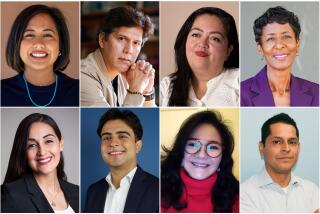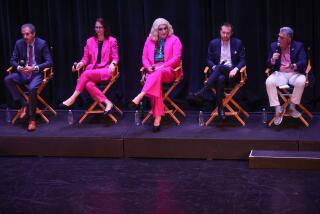NEWS ANALYSIS : Candidates Weigh Funding Risks
- Share via
Los Angeles mayoral candidates have had to grapple with an ironic political calculation in recent days--the potential risks of tapping new voter-approved, public campaign funds that are a centerpiece of election reform efforts.
Wealthy lawyer-businessman Richard Riordan, the only prominent candidate in the race who is forgoing public funds, has signaled a willingness to attack others who take the money.
“We think it is a legitimate issue,” said Bill Wardlaw, Riordan’s campaign chairman. “At a time when we don’t
have enough police on the streets of the city . . . we think it is a questionable use of public taxpayer money to give it to (campaign) consultants and put on commercials.”
In lieu of public funds, Riordan has said he is prepared to draw on his personal fortune, estimated at about $100 million, to fund a campaign that may well exceed the $2-million spending limit envisioned under the city’s new campaign law.
Other prominent candidates have indicated that they will seek city funds to match donations up to a cap of $333,500--with a higher limit possible as the campaign progresses. Councilman Michael Woo last week became the first to apply for the money.
In return for the funds--which were set aside as part of an effort to curb reliance on special interests--candidates must agree to adhere to spending limits and additional campaign disclosure requirements.
Fearing Riordan mailers and commercials that could portray his opponents as lapping campaign funds at the public trough, candidates have been weighing the benefits and risks of applying for matching funds under the new program.
Peter Kelly, finance chairman for Assemblyman Richard Katz (D-Panorama City), considered among the leading contenders to succeed Mayor Tom Bradley, said: “There’s no question, it’s a factor. . . . We’ve been thinking about (Riordan’s) argument.”
Even strong proponents of public campaign financing say Riordan could hit a nerve with voters, given the needs of the riot-torn city and the deepening budget problem.
“It’s an easy issue to exploit,” said Ruth Holton, acting executive director of California Common Cause, a watchdog group that backed the new campaign finance program.
“It’s complicated to explain” how public matching funds encourage broader participation by small individual donors, diminish the clout of powerful vested interests and save public money in the long run, she said.
The city Ethics Commission, which is administering the $8-million matching fund, is trying to defend the program without getting caught in the candidates’ cross-fire.
“It’s part of the solution to restore confidence in government,” said Benjamin Bycel, the commission’s executive director. “I think it’s rather cynical to twist it around as part of the problem.”
The use of public funds will not be a central theme of Riordan’s campaign, Wardlaw said, although he “wouldn’t rule out” using it in commercials and political mailers.
“If you ask the voters of this town, one of the last (public spending) priorities would be for political purposes,” Wardlaw said, noting that recent studies have shown the Los Angeles Police Department fields only 350 officers on a typical day to patrol the entire city.
Riordan is not alone on the issue. Councilman Zev Yaroslavsky, who is seeking reelection in his Westside district, is refusing matching funds and urging others to do the same. Among other things, Yaroslavsky cites the city’s fiscal crisis.
In New York City, which has had a public campaign finance program for several years, attacks on the use of taxpayer funds have not proven effective. In the 1989 mayoral campaign, Republican businessman Ronald Lauder spent $13 million of his own money on his campaign and criticized the use of city money by other candidates. Lauder lost in the primary.
Riordan’s opponents will be hard-pressed to pass up the public funds, particularly given Riordan’s access to millions of dollars in his own money. Less than three months remain before the primary election, and most of the top candidates still have a long way to go in reaching their goals of $1 million to $2 million.
The recession, a series of costly federal campaigns in California and a crowded, diverse field of candidates have made fund-raising more difficult than previously envisioned, campaign managers said.
Rejecting hundreds of thousands of dollars in public funds would force candidates to intensify their contribution chase, leaving them less able to focus on campaigning.
Riordan’s opponents hope to blunt criticism of their use of public funds by stressing that this is what the electorate wanted.
If Riordan exceeds the $2-million spending limit, candidates taking public funds will be free to raise and spend above the limit.
At that point, Riordan could be portrayed as trying to “buy the office,” his opponents say.
In addition to performing legal work for local government, Riordan has been a venture capitalist and was involved in leveraged buyouts in the 1980s, some financed through a Drexel Burnham Lambert unit headed by junk bond wizard Michael Milken.
More to Read
Sign up for Essential California
The most important California stories and recommendations in your inbox every morning.
You may occasionally receive promotional content from the Los Angeles Times.










